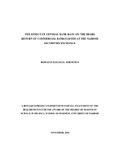| dc.description.abstract | A sound financial sector not only fosters economic growth by mobilizing resources for
investment, but also provides a framework for undertaking effective monetary policy.
The banking system and the financial system more generally, is a key pillar in any
economy, considering its basic function, which is to reallocate funds from agents with a
surplus to those with a deficit. A well-developed financial system promotes economic
growth by enabling economic agents to diversify their portfolios and meet their liquidity
requirements. The objective of this project was to determine the effect of central bank
rate on the stock return of shares of commercial banks listed at the Nairobi Securities
Exchange. The study adopted a descriptive research design.
The total population consisted of all 61 companies listed at the equity section of the NSE
as at 31 December 2013. Since the population of the study was small, the study was using
secondary data which was readily available from both the Central Bank of Kenya and the
Nairobi Securities Exchange, all the listed commercial banks were be included hence a
census study. The data was collected using data collection sheet which was edited, coded
and cleaned. The study established that the independent variable CBR and the moderating
variables TBR, REPO, and Inflation had varying degrees of relationship with the share
returns.
The study established that central bank rate influenced the returns of commercial banks
listed at the NSE positively. The study also deduced that inflation rate negatively
influenced the returns of commercial banks listed at the NSE. The study also revealed
that Repo rates positively influenced returns of the listed commercial banks at the NSE.
This study also established that repo rates were positively correlated with the returns at
the commercial banks listed at the NSE while inflation rate negatively influenced returns.
However, the variables were generally statistically insignificant as indicated by the high
significant values. This study therefore recommended that the Country should handle its
macroeconomic policies appropriately as the changes in the macroeconomics like repo
rates and inflation bring about devaluation of the currency and affect the performance of
the commercial banks listed at the Nairobi Securities Exchange. | en_US |

